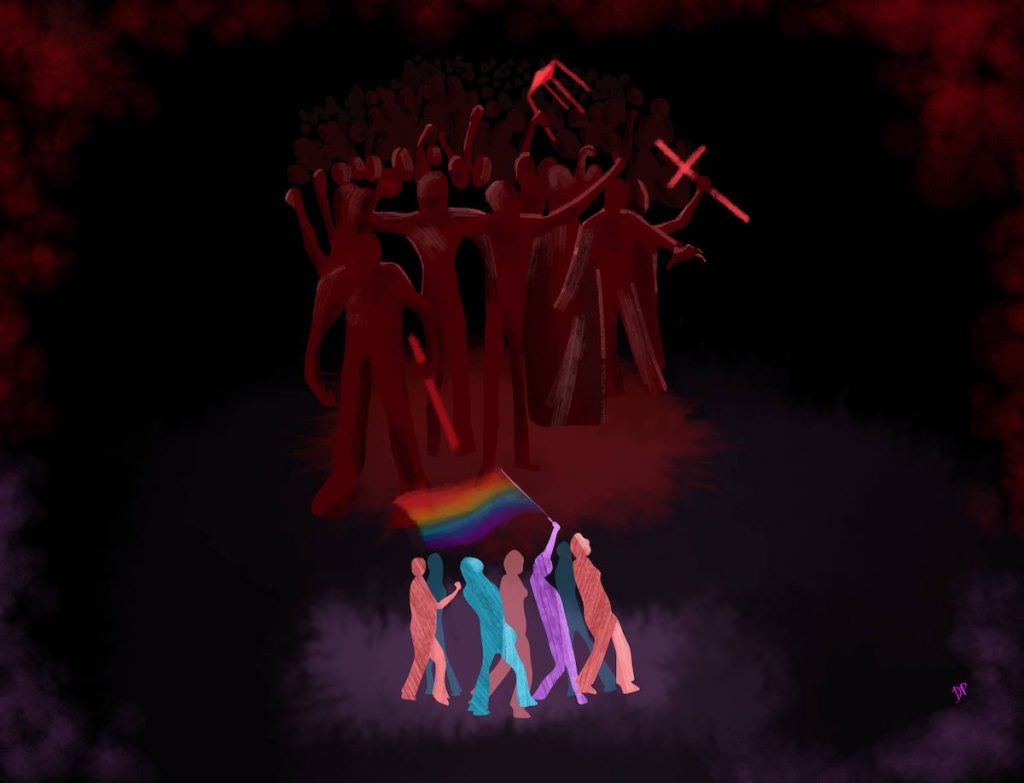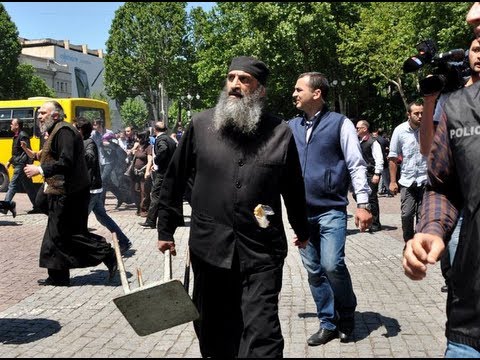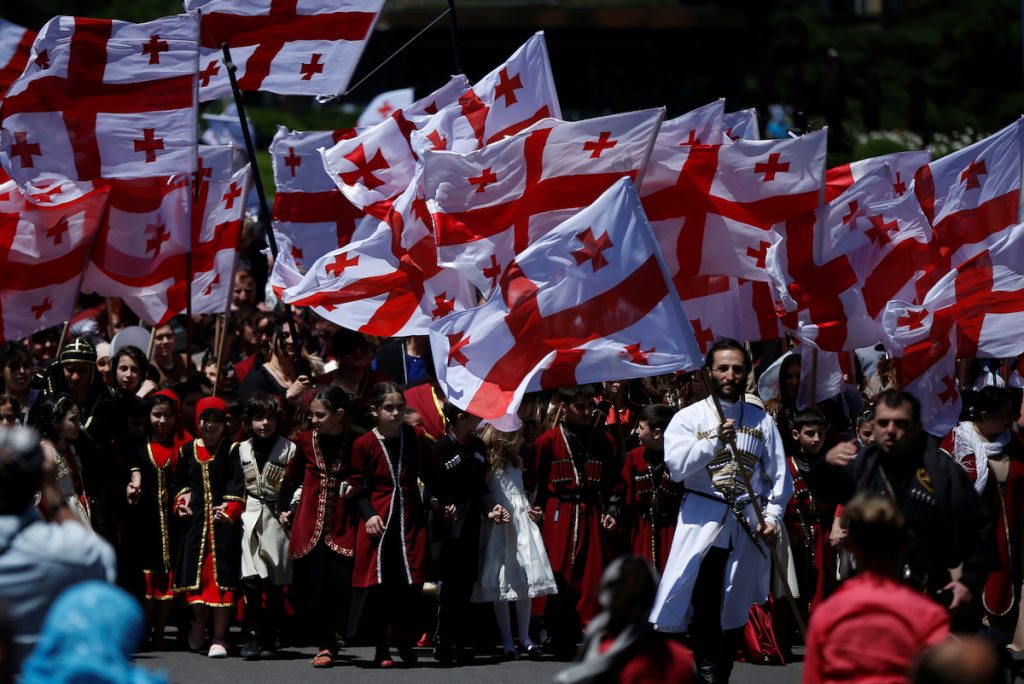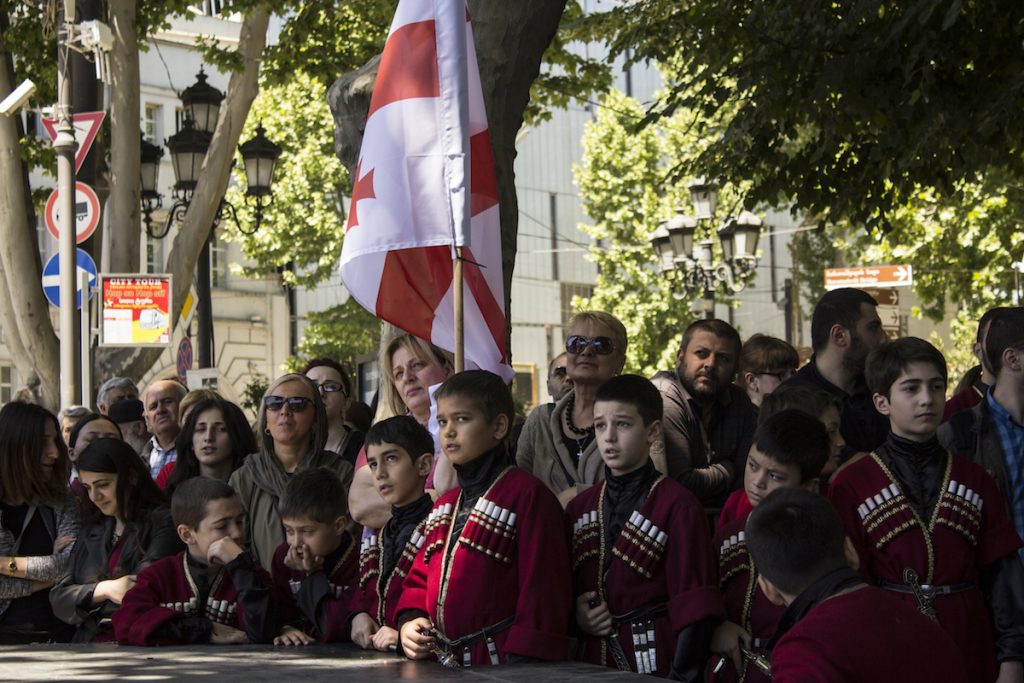The history of Georgia's LGBT+ community's struggle for equal rights and non-discrimination
The history of LGBT+ community in Georgia
How is the LGBT+ community of Georgia fighting for its rights and what has it achieved in recent years?

May 17 is the International Day Against Homophobia and Transphobia and it was first celebrated in Tbilisi in 2011.
It was a quiet and inconspicuous event – then a small group of representatives of the LGBTQ community lowered lighted candles into the Kura river and let them go adrift. This symbolic act was dedicated to people who had to sacrifice their lives in the fight against homophobia.
“We thought that there would be ten people, but about 50 ended up coming. I got to know some of them there. That day I saw that the community wanted to be visible”, says Nikolo Gviniashvili, an LGBT+ activist and one of the organizers of the event.
According to him, the action on May 17, 2011, was the only one in Georgia when there was no violence. Soon everything changed.
- ‘You never know, whether you’ll return home alive or not’
- Living surrounded by hate. LGBT individuals and their parents in Georgia
- Anti-vaxxing, homophobia, pro-Russian sentiments – is the church an obstacle on Georgia’s pro-Western course?
The worst was May 17, 2013. On this day, LGBT+ activists were going to hold a rally in honor of the day of the fight against homophobia near the parliament. However, a small group of LGBT+ people and their supporters were attacked by tens of thousands of homophobes.
Stones, sticks, and various heavy objects were thrown at the activists and the aggressive groups were led by clergymen.
One of the priests beat up the protesters with a stool. Since then, the image of an aggressive man in a cassock with a stool as a weapon has become a symbol of Georgian homophobes:

Police evacuated LGBT+ activists on buses, and the crowd continued to throw stones at the buses.
Several dozen people were injured then.
“On May 17, I remember there was one two-meter guy who shrank under a chair in horror like an embryo. I still don’t understand how he managed to fit there”, says Nikolo Gviniashvili.
“May 17, 2013 was an important day. On that day, things were called by their proper names, we saw a degree of hatred towards us. Everything that was previously invisible surfaced”, says Giorgi Tabagari, an LGBT+ activist and organizer of the Tbilisi Pride. – “In 2014, LGBT+ representatives refused to celebrate the Day against Homophobia and Transphobia at all for security reasons. No one was punished for the violence that occurred a year earlier, so LGBT+ activists felt that the government had encouraged homophobes. In 2014, the patriarchate decided to give a new meaning to the most important day of May 17 for our community: it declared this date a day of family sanctity and promised to protect the country from “legalized immorality”.
Since then, every year on May 17, the church, which has taken over the day, pompously celebrates the Day of the Holiness of the Family. In Tbilisi and other cities, processions are held with the participation of families, including children.


However, representatives of the LGBT+ community, continue to fight for public space and for the right to celebrate May 17. But any events on this day are inevitably accompanied by aggression, and the police cannot protect the LGBT+ community from it even after 10 years.
There are laws, but they do not work
LGBT activists note that one of the main problems is that laws protecting LGBTQ people from discrimination and violence do not work in practice.
Hate crimes were mentioned in the Georgian Criminal Code back in 2012. It was assumed that since then the punishment for crimes motivated by hatred on the basis of sexual orientation, gender identity or other similar characteristics would be tightened.
“Until 2017, we did not have a single case of application of this law. The vast majority of hate crimes have disappeared from the history of law”, said Lika Jalagania, a lawyer at the Center for Social Equality.
In 2014, the Georgian government adopted an anti-discrimination law. This law, in theory, should protect people from all forms of discrimination, including discrimination based on sexual orientation and gender identity.
However, it took years for this law to be implemented.
“Law enforcement mechanisms are gradually emerging, but they are mainly used for small cases. There are a number of cases, for example, when law enforcement agencies simply turn a blind eye to the activities of far-right groups”, said Lika Jalagania.
Another problem is that LGBT+ people do not trust the police and the prosecutor’s office and only seek help when faced with immediate physical danger. Lika Jalagania says that the state does not understand the needs of the LGBT community: “The state does not talk with the community, does not know what it wants. The application of laws in practice is difficult. We have changes in legal documents, but they did not affect the real life of people”.
Lika Jalagania added that the state does not have a unified strategy to prevent homophobic violence, which would gradually change the attitude of society and thus protect LGBTQ people from violence.
“It fights with the result only but does not investigate the cause and does not eliminate it”, says Lika.
Non-governmental and public organizations are more involved in supporting LGBT+ in Georgia. They are often the ones who offer shelter and basic services to community members. “Today, there are many internal help networks that were few in the past. Help and salvation come from within. They live like families and treat each other like family members”, said Nukri Maya Tabidze, an LGBT+ activist and researcher.
Homophobia decreases, but poverty increases
Despite everything, changes are evident, activists say.
Increasing access to information and different cultures is gradually replacing stigma and stereotypes. Many sectors of society are showing increasing support to the LGBT+ community.
“It was very difficult for us to find LGBT+ supporters to record a video with them to participate in the campaign on May 17, 2017. Today their number has increased dramatically – people no longer hesitate to say openly that oppression and violence are unacceptable”, said Giorgi Tabagari.
If a few years ago someone could be beaten on the street due to improper clothing and behavior, today the chances of doing so are much lower. The townspeople are more or less accustomed to people who look different.
More and more LGBT bars and clubs are opening in Tbilisi.
However, as observers note, these changes have not yet changed one important factor – the poverty faced by the LGBT+ community.
“It seems that homophobia has diminished, as has the influence of the church, but not much has changed in real life”, said gender researcher Nukri Maya Tabidze.
A 2021 study by the Center for Social Justice found that LGBT+ members are often psychologically abused and often have mental health problems due to trauma.
They prefer to work in places where they are less likely to be bullied – these jobs are few and often low paying.
Due to poverty, LGBT+ people do not have access to a full-fledged education and health care system and people are often expelled from families because of their orientation, leaving them homeless.
The situation is even more complicated with LGBT+ people living in the regions. Their voices are often not heard at all.
They prefer to remain silent because the shift in consciousness in the regions is slower, and often families and the police are especially aggressive towards them, along with the public.
Those who break the silence are forced to come to Tbilisi, where they face unemployment, homelessness and poverty.
“They flee to Tbilisi because there are more resources and less homophobia. But it is very difficult to survive in Tbilisi, you have to get a job, many of them become sex workers. Many members of the community go abroad. They say that they do it because of homophobia. Yes, this is partly true, but the majority are just trying to avoid poverty”, said Beka Gabadadze, an LGBT+ activist.
According to Lika Jalagania, the state views the LGBT+ community only through one prism – it offers it freedom from violence.
“But if we want to tackle the problem of inequality, homophobia and transphobia, we must take into account its complexity. Everything is intertwined and no link in this chain can be missed. The state does not see this. Today, most of the citizens of Georgia, and especially the LGBT+ group, are left alone with this social injustice”, the expert says.


















